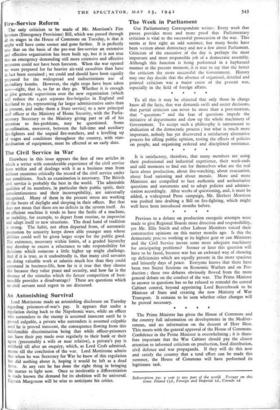Fire-Service Reform
The only criticism to be made of Mr. Morrison's Fire Services (Emergency Provisions) Bill, which was passed through all its stages in. the House of Commons on Tuesday, is that it might well have come sooner and gone farther. It is perfectly true that on the basis of the pre-war fire-service an extensive and effective organisation has been built up, but it is not true that an emergency demanding still more extensive and effective measures could not have been foreseen. When the war opened we were prepared for far heavier air-raid casualties than have in fact been sustained ; we could and should have been equally prepared for the widespread and indiscriminate use of incendiary bombs. However, the right steps have been taken now—right, that is, so far as they go. Whether it is enough to give general supervision over the new organisation (which will reduce the 1,400 separate fire-brigades in England and Scotland to so, representing far larger administrative units than at present, and make them a State service) to a new principal staff officer at the Ministry of Home Security, with the Parlia- mentary Secretary to the Ministry giving part or all of his attention to fire-problems, may be questioned. Some co-ordination, moreover, between the full-time and auxiliary fire-fighters and the unpaid fire-watchers, and a levelling up of wages and conditions throughout the country, with stan- dardisation of equipment, must be effected at an early date.






























 Previous page
Previous page